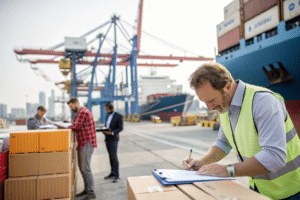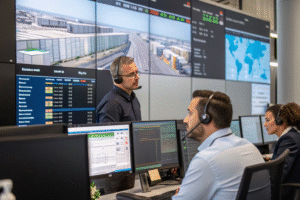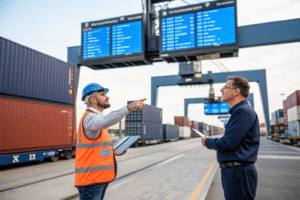Shipping delays. Misrouted goods. Lost tracking numbers. For many growing businesses importing from China to the U.S. or Europe, these aren’t rare occurrences—they're daily nightmares. I’ve worked with countless clients, like Ron from the U.S., who turned to us after experiencing these exact problems with fragmented logistics providers.
Freight forwarders streamline logistics operations by integrating booking, transportation, customs, and warehousing into one seamless service, reducing delays, costs, and communication gaps.
Whether you're an apparel importer or a gift distributor moving containers from Shenzhen to Los Angeles, streamlining your logistics means saving time and protecting your margins.
What Operational Tasks Can Freight Forwarders Handle?
Managing global logistics isn't just about booking space—it’s about orchestrating dozens of moving parts with precision.
A reliable freight forwarder acts as your outsourced logistics department, managing every link in your supply chain.

What Is Included in Full-Service Freight Forwarding?
At GeeseCargo, we provide full-stack freight management. This includes:
- Carrier booking (air, ocean, rail, or multimodal)
- Pickup from supplier factory
- Warehousing or consolidation
- Customs documentation and clearance
- Destination delivery and deconsolidation
We use an integrated logistics platform to monitor all stages and provide live updates to clients. You can learn more about how forwarders consolidate services from Freightos.
How Do We Simplify Vendor Communication?
Instead of coordinating separately with 3PL warehouses, truckers, and customs brokers, our clients only talk to us. We handle:
- Supplier pickups with pre-scheduled trucking fleets
- Document preparation for origin/destination customs
- Exception management with escalation alerts
Our centralized communication portal makes follow-ups efficient. For a deep dive, see Project44’s Visibility Guide.
How Do Digital Tools Enhance Freight Efficiency?
Digital transformation in freight forwarding is no longer a luxury—it’s a must-have. If your current provider is still emailing spreadsheets, it’s time to upgrade.
Modern freight forwarders use digital platforms to track shipments, reduce paperwork, and accelerate customs.

What Technologies Power Our Logistics Network?
At GeeseCargo, we use:
- Transportation Management System (TMS): Route planning, carrier rates, ETA optimization
- Warehouse Management System (WMS): Inventory scanning and release
- EDI/API Integration: Connects with client ERPs
- GPS-based tracking: Real-time vehicle monitoring
- Customs pre-clearance tools: Speeds up border crossings
See how TMS works with this Oracle Freight Cloud article.
How Does Automation Reduce Errors?
Manual booking or clearance often leads to shipment delays or overcharges. Our automation system handles:
- Container load planning
- Document filing (like Bill of Lading, Invoice, Packing List)
- Digital approvals and POD upload
By reducing reliance on email chains, we eliminate bottlenecks and errors. Companies like Flexport also highlight similar advantages of automation.
How Can Freight Forwarders Reduce Operational Costs?
Logistics inefficiency eats into profits. Every delay, missed booking, or unnecessary handoff adds cost and confusion.
Freight forwarders cut costs by improving route efficiency, consolidating shipments, and avoiding late fees.

What Cost-Saving Strategies Do We Use?
We analyze client shipping history to:
- Recommend optimal incoterms (like switching to DDP or FCA)
- Combine partial loads (LCL) into FCL when volume permits
- Choose faster customs routes with lower inspection ratios
- Book space during off-peak sailing schedules
We also maintain carrier partnerships that give us better rates for air and ocean freight. Maersk’s contract advantage illustrates how long-term partnerships lower costs.
How Does GeeseCargo Avoid Delay Penalties?
Demurrage and detention fees are some of the most painful expenses in freight. We prevent them by:
- Booking early slots
- Sending pre-alerts to port handlers
- Having customs ready 48 hours before vessel arrival
For more on how forwarders fight demurrage, check Container xChange’s report.
Why Is Centralized Logistics Management Important?
Scattered logistics systems waste time. Clients spend hours following up with different parties—truckers, warehouse staff, customs brokers.
Freight forwarders bring everything under one roof, creating a single point of truth and action.

What Are the Benefits of Centralized Control?
With us, clients experience:
- Single dashboard visibility of all cargo
- Fewer missed handovers between logistics stages
- Easier reporting and invoice reconciliation
- Streamlined compliance and document storage
It’s all managed through one portal, instead of 10 email threads. Explore centralized freight solutions from Kuehne+Nagel.
Can Centralization Improve Customer Satisfaction?
Absolutely. Many of our clients are selling to large U.S. retailers or Amazon FBA. They need:
- Fast processing
- Accurate delivery windows
- Reliable documentation
When logistics is streamlined, your customer gets the product on time and in perfect condition. That’s what builds repeat business.
Conclusion
Freight forwarders aren’t just middlemen—they’re orchestrators. By bringing order, visibility, and tech-driven efficiency to complex global shipping, we give you something invaluable: peace of mind. At GeeseCargo, we make logistics work for you, not against you. Whether you're scaling up your imports or battling late shipments, let us show you how professional freight coordination can be the engine behind your growth.









